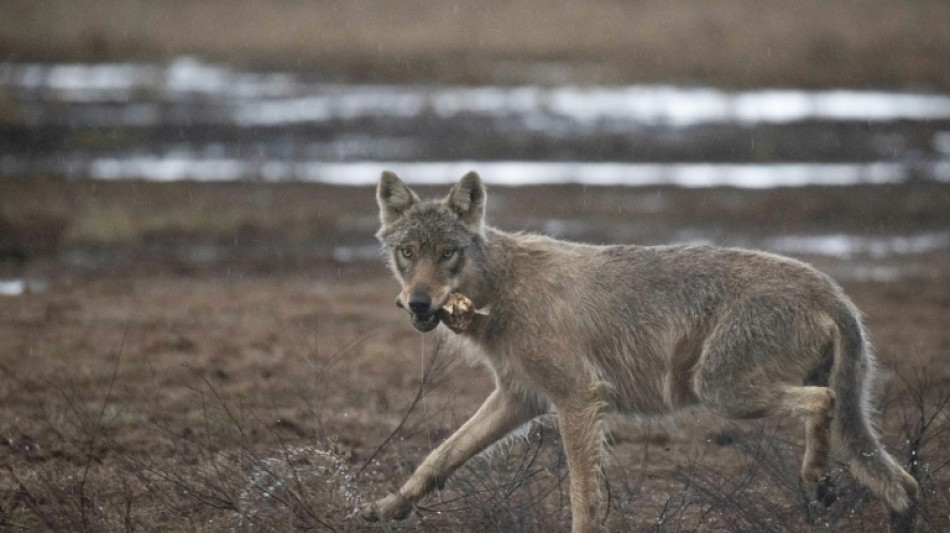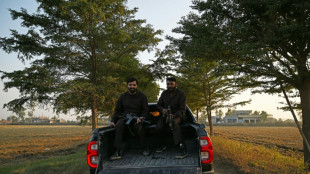
-
 Hungry Sabalenka ready for more Slam success
Hungry Sabalenka ready for more Slam success
-
Mass jailbreak in Mozambique amid post-election unrest

-
 Bridges outduels Wembanyama as Knicks beat Spurs
Bridges outduels Wembanyama as Knicks beat Spurs
-
2004 Indian Ocean tsunami: what to know 20 years on

-
 Asia to mourn tsunami dead with ceremonies 20 years on
Asia to mourn tsunami dead with ceremonies 20 years on
-
Syrians protest after video of attack on Alawite shrine

-
 Russian state owner says cargo ship blast was 'terrorist attack'
Russian state owner says cargo ship blast was 'terrorist attack'
-
Crisis-hit Valencia hire West Brom's Corberan as new boss

-
 Suriname ex-dictator and fugitive Desi Bouterse dead at 79
Suriname ex-dictator and fugitive Desi Bouterse dead at 79
-
Syria authorities say torched 1 million captagon pills

-
 Pope calls for 'arms to be silenced' across world
Pope calls for 'arms to be silenced' across world
-
32 survivors as Azerbaijani jet crashes in Kazakhstan

-
 Pakistan air strikes kill 46 in Afghanistan, Kabul says
Pakistan air strikes kill 46 in Afghanistan, Kabul says
-
Liverpool host Foxes, Arsenal prepare for life without Saka

-
 Zelensky condemns Russian 'inhumane' Christmas attack on energy grid
Zelensky condemns Russian 'inhumane' Christmas attack on energy grid
-
Sweeping Vietnam internet law comes into force

-
 Pope kicks off Christmas under shadow of war
Pope kicks off Christmas under shadow of war
-
Catholics hold muted Christmas mass in Indonesia's Sharia stronghold

-
 Japan's top diplomat in China to address 'challenges'
Japan's top diplomat in China to address 'challenges'
-
Thousands attend Christmas charity dinner in Buenos Aires

-
 Demand for Japanese content booms post 'Shogun'
Demand for Japanese content booms post 'Shogun'
-
As India's Bollywood shifts, stars and snappers click

-
 Mystery drones won't interfere with Santa's work: US tracker
Mystery drones won't interfere with Santa's work: US tracker
-
Djokovic eyes more Slam glory as Swiatek returns under doping cloud

-
 Australia's in-form Head confirmed fit for Boxing Day Test
Australia's in-form Head confirmed fit for Boxing Day Test
-
Brazilian midfielder Oscar returns to Sao Paulo

-
 'Wemby' and 'Ant-Man' to make NBA Christmas debuts
'Wemby' and 'Ant-Man' to make NBA Christmas debuts
-
US agency focused on foreign disinformation shuts down

-
 On Christmas Eve, Pope Francis launches holy Jubilee year
On Christmas Eve, Pope Francis launches holy Jubilee year
-
'Like a dream': AFP photographer's return to Syria

-
 Chiefs seek top seed in holiday test for playoff-bound NFL teams
Chiefs seek top seed in holiday test for playoff-bound NFL teams
-
Panamanians protest 'public enemy' Trump's canal threat

-
 Cyclone death toll in Mayotte rises to 39
Cyclone death toll in Mayotte rises to 39
-
Ecuador vice president says Noboa seeking her 'banishment'

-
 Leicester boss Van Nistelrooy aware of 'bigger picture' as Liverpool await
Leicester boss Van Nistelrooy aware of 'bigger picture' as Liverpool await
-
Syria authorities say armed groups have agreed to disband

-
 Maresca expects Man City to be in title hunt as he downplays Chelsea's chancs
Maresca expects Man City to be in title hunt as he downplays Chelsea's chancs
-
South Africa opt for all-pace attack against Pakistan

-
 Guardiola adamant Man City slump not all about Haaland
Guardiola adamant Man City slump not all about Haaland
-
Global stocks mostly higher in thin pre-Christmas trade

-
 Bethlehem marks sombre Christmas under shadow of war
Bethlehem marks sombre Christmas under shadow of war
-
11 killed in blast at Turkey explosives plant

-
 Indonesia considers parole for ex-terror chiefs: official
Indonesia considers parole for ex-terror chiefs: official
-
Postecoglou says Spurs 'need to reinforce' in transfer window

-
 Le Pen says days of new French govt numbered
Le Pen says days of new French govt numbered
-
Villa boss Emery set for 'very difficult' clash with Newcastle

-
 Investors swoop in to save German flying taxi startup
Investors swoop in to save German flying taxi startup
-
How Finnish youth learn to spot disinformation

-
 12 killed in blast at Turkey explosives plant
12 killed in blast at Turkey explosives plant
-
Panama leaders past and present reject Trump's threat of Canal takeover


Wildlife commission lowers European wolf protections
Dozens of countries on Tuesday approved downgrading the protection status of the wolf in Europe, a move activists say will upset the recovery made by the species over the past 10 years after near extinction a century ago.
The 49 member states of the Bern Convention charged with the protection of wildlife in Europe and some African countries agreed to lower the wolf's protection status from "strictly protected" to "protected", the Council of Europe said.
Grey wolves were virtually exterminated in Europe 100 years ago but their numbers have practically doubled to the current population of 20,300, triggering protests from farmers angry over the animals eating their livestock.
Demoting wolves to "protected" status would allow hunting to resume under strict regulation, a move activists fear could result in a large number of the species being shot dead.
"We need a balanced approach between the preservation of wildlife and the protection of our livelihoods," said European Commission President Ursula von der Leyen, who has strongly backed the lowering of the protection.
The Bern Convention is an international treaty of the Strasbourg-based Council of Europe in nature conservation which came into force in 1982.
The European Union, which is entirely separate from the Council of Europe, is a party to the convention.
- 'Far from solved' -
The move comes after the EU backed a plan in September to lower the protection status of wolves as the species' growing population brings the creatures into more frequent contact with humans.
The carnivores' proximity to human activity is causing damage to livestock at "significant levels", said Brussels.
In late 2022, von der Leyen herself lost her beloved pony Dolly to a wolf that crept into its enclosure on her family's rural property in northern Germany -- leading some to suggest the matter had become personal.
But some farmers say Tuesday's decision is not enough to protect their livestock.
"The problem is far from being solved", said Thierry Chalmin, head of a chamber of agriculture in northeastern France.
"What's the difference between a super-bandit and a bandit," added Chalmin, who in September encouraged farmers to "go out armed and shoot a wolf" if they see one.
- 'Purely demagogic' -
Animal-rights activists say the move puts at risk the wolf population, which at one point disappeared entirely from France.
"The risk of downgrading this status is to weaken or even cause the decline of this species in Europe," said Yann Laurans of WWF France.
Some say culling the wolf population will not reduce the number of attacks on livestock.
The decision is "political and purely demagogic," said Nathan Horrenberger, head of a France-based biodiversity association.
"It's not going to help solve the problems facing livestock farmers, because wolves have been shot in European countries for years... and it's not bearing fruit", he added.
Killing wolves might even disrupt pack behaviour, creating "more solitary animals, who turn to easier prey, namely farm animals", Horrenberger told AFP.
The change will be implemented on March 7, 2025, said the commission, unless at least a third of its members object.
But only five countries voted against the measure, said environmental association Green Impact, which called the decision a "disgrace" and vowed to take it to the European courts.
"The wolf remains a protected species," said Paris's ecology minister Agnes Pannier-Runacher, promising any killing of the carnivore "will remain highly regulated".
But "this change will make it easier to manage the species", added Pannier-Runacher.
A.Motta--PC



